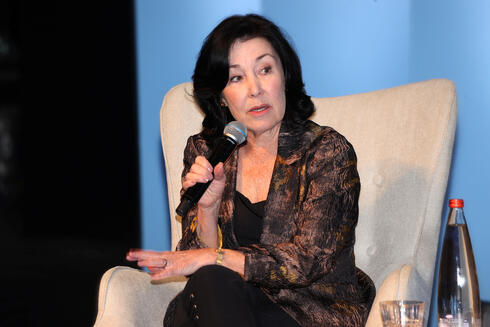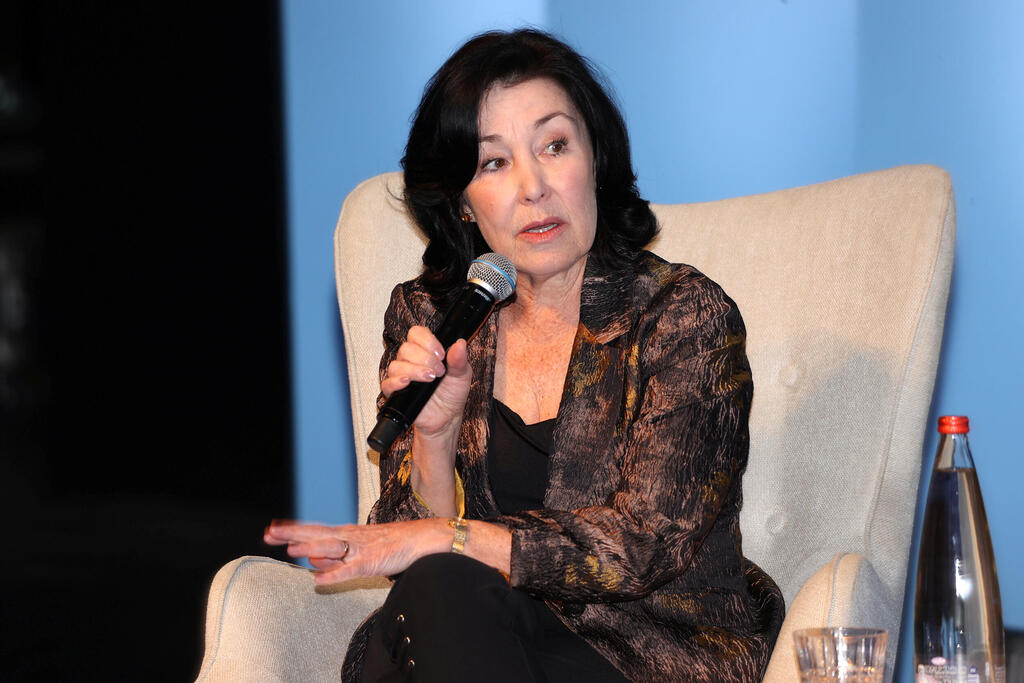
National Economic Conference
Oracle CEO: "Some of the best people in the world are here in Israel, and there's no question about that"
Safra Catz believes Israel's knack for producing “the brightest minds and the best problem solvers” will keep foreign capital flowing. She likens the current AI gold rush to Israel’s rise in cybersecurity, dozens of startups blooming, then consolidating into global leaders.
Safra Catz
(Yariv Katz / Streame)
Few top American CEOs have stood by Israel as publicly, and as persistently, as Safra Catz. Since Hamas’s October 7th attacks nearly two years ago, the CEO of Oracle has visited the country four times, each visit a statement of confidence that contrasts sharply with the creeping doubt now felt even among Israelis themselves.
Speaking at Calcalist and Bank Leumi’s National Economic Conference on Tuesday, Catz was blunt about her unwavering optimism. “Not one minute did I actually feel pessimistic,” she told Calcalist reporter Sophie Shulman, recalling how she’d hesitated to visit just after October 7th, not out of fear, but to avoid burdening a country still counting its dead. When she did arrive, she found herself drawing strength from a society that, in her telling, has become a symbol of resilience.
“I thought I was coming to support my employees, the people of Israel, the Jewish people in the diaspora,” she said. “And in fact… you all supported me.”
That conviction has translated into Oracle’s business strategy, too. Catz waved off any notion that the war or the surge of global criticism of Israel might scare off investors or tech buyers. Quite the opposite, she argued: “Our support has improved our business,” she said, pointing to Oracle’s record stock price and its deepening ties to the biggest names in AI.
The Oracle chief’s forthright embrace of Israel makes her an outlier in Silicon Valley’s C-suite. Where other tech leaders often stay publicly neutral on one of the world’s most polarizing conflicts, Catz insists it’s “not complicated.”
“We are on the side of freedom. We are on the side of democracy,” she said, dismissing concerns that outspoken positions might dent Oracle’s share price or bottom line.
Catz’s defiance is rooted, in part, in what she sees as Israel’s enduring technological edge. Even with war on its borders, she believes the country’s knack for producing “the brightest minds and the best problem solvers” will keep foreign capital flowing. She likens the current AI gold rush to Israel’s rise in cybersecurity, dozens of startups blooming, then consolidating into global leaders.
“Let me tell you, some of the best people in the world are here in Israel, and there's no question about that. And everyone knows it,” she said confidently. “Some of the big winners will be here. Mark my words.”
As Oracle expands its cloud footprint across the Middle East, with new data centers from Saudi Arabia to Bahrain, Israel still sits at the heart of its regional strategy. The company built an underground facility in Jerusalem, nine stories below the surface. “Our competitors didn’t think to do that,” Catz noted pointedly.
Some observers see Oracle’s expanding Gulf presence as a sign that Israel risks being left out as its Arab neighbors sprint ahead with AI and digital infrastructure. Catz rejected that view outright. The Abraham Accords, she argued, “changed the face of the Middle East,” strengthening Israel’s role in a region where “everyone knows” it remains “central to success.”
Despite recent diplomatic disappointments, no breakthrough on hostages, no Gaza ceasefire, no new regional deals, she urged Israelis not to lose perspective. “You disappoint too easily,” she chided gently, reminding her audience that the Jewish people’s history has endured “little disappointments and big disasters,” and survived them all.
For Oracle itself, the stakes in AI are enormous. While rivals battle to build the next dominant large language model, Catz argued that Oracle’s value lies not in fighting for the top spot but in providing the secure, scalable infrastructure these AI titans need, and embedding the best models directly into its software stack.
“We don’t need to let them fight above us,” she said. “We bring the platform, we bring the applications, and we let our customers choose.”
She brushed aside headlines about sky-high AI salaries and talent poaching as more spectacle than substance. Oracle’s advantage, she suggested, comes not from chasing buzzy individuals but from decades of technical bets made by co-founder Larry Ellison and the company’s seasoned engineers.
The conversation ended with a question that has followed Catz for years: would she ever leave Oracle for politics? After all, she was once floated as a candidate for a top economic post in the Trump administration. But Catz waved the idea away. “I have the greatest job on earth,” she said, leaving little doubt where her loyalty lies.
If her words are any guide, that loyalty extends far beyond Redwood Shores, from the Oracle boardroom to an underground data bunker in Jerusalem.
















